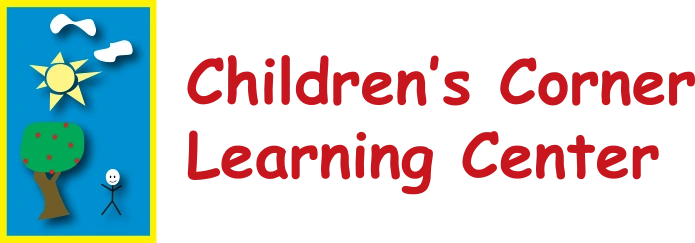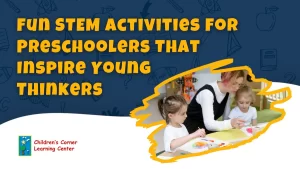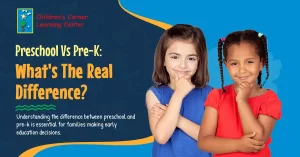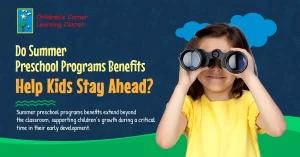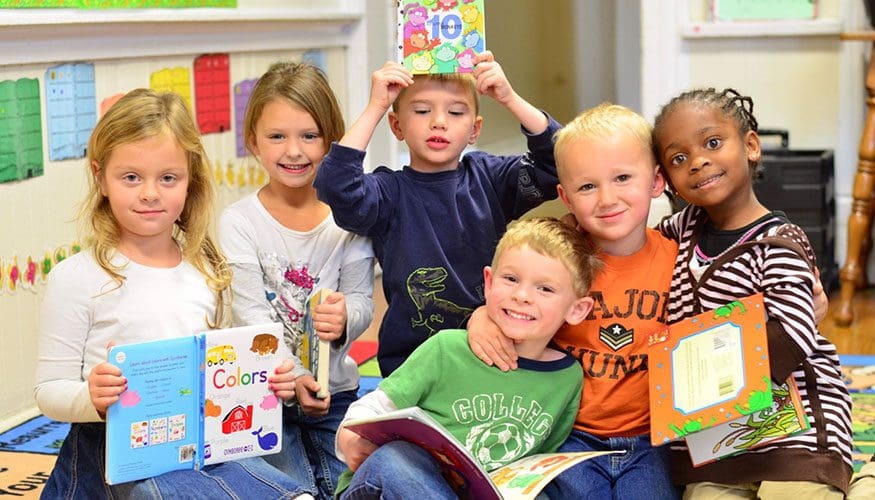Finding the right preschool White Plains families trust is pivotal in your child’s educational journey. Preschool is more than just a place for care—it’s where children begin to build foundational skills, explore their creativity, and form meaningful connections with peers. With so many options available, choosing the right program can feel overwhelming.
Every family has unique priorities, whether focusing on early learning, nurturing social development, or ensuring a safe and engaging environment. This guide is designed to help you navigate the diverse preschool options in White Plains, providing insights into what to look for and how to make the best choice for your little one.
The Importance of Early Childhood Learning in Preschool
Early childhood learning in preschool is a crucial step in your child’s development, setting the foundation for lifelong success. During these formative years, children are like sponges, absorbing information and experiences that shape their cognitive, social, and emotional growth. Understanding the importance of early education helps you make informed decisions that will benefit your child now and in the future.
Laying the Foundation for Lifelong Learning
Preschool is more than just a place for care; it’s where the learning journey begins. Early childhood learning introduces essential skills and concepts that prepare children for academic challenges.
Key benefits of early learning include:
- Language Development: Engaging in conversations, storytelling, and singing enhances vocabulary and communication skills.
- Basic Math Skills: Activities involving counting, sorting, and recognizing patterns build a foundation for mathematical understanding.
- Curiosity and Exploration: Hands-on experiences encourage children to ask questions and discover the world around them.
Fostering a love for learning early on will help children remain enthusiastic and confident as they progress through their educational journey.
Cognitive Development Through Stimulating Activities
The preschool environment stimulates cognitive growth through play-based and structured activities. These experiences promote critical thinking and problem-solving abilities.
Activities that boost cognitive development:
- Puzzles and Games: Enhance memory, concentration, and strategic thinking.
- Creative Arts: Drawing, painting, and crafting stimulate imagination and fine motor skills.
- Science Exploration: Simple experiments introduce concepts of cause and effect and nurture analytical thinking.
Such activities make learning fun and equip children with the skills needed for complex reasoning in later years.
Social and Emotional Growth
Early childhood learning in preschool significantly impacts a child’s social and emotional development. Interacting with peers and teachers helps children understand themselves and others, building empathy and cooperation.
Aspects of social and emotional development include:
- Emotional Awareness: Recognizing and expressing feelings appropriately.
- Social Skills: Learning to share, take turns, and work in groups fosters positive relationships.
- Self-Confidence: Achieving small goals boosts self-esteem and encourages independence.
These skills are critical for navigating social situations and contribute to a child’s well-being.
Preparing for Kindergarten and Beyond
Preschool acts as a bridge between home and formal schooling, easing the transition into kindergarten. Early childhood learning equips children with the routines and expectations of a classroom setting.
Preparation includes:
- Understanding Classroom Routines: Following schedules and adapting to structured environments.
- Listening and Communication Skills: Pay attention to instructions and articulate thoughts.
- Basic Academic Readiness: Recognizing letters, numbers, and shapes lays the groundwork for reading and math.
Children are better positioned to succeed academically and socially by entering kindergarten with these skills.
The Long-Term Impact of Early Childhood Learning
Investing in early childhood learning has lasting effects that extend well into adulthood. Research shows that children who attend quality preschool programs are more likely to perform better, graduate high school, and pursue higher education.
Long-term benefits include:
- Enhanced Academic Performance: Strong early foundations improve grades and test scores.
- Improved Social Relationships: Early socialization skills contribute to healthier friendships and teamwork abilities.
- Greater Career Opportunities: Lifelong learning habits increase the likelihood of professional success.
By prioritizing early education, you’re not just preparing your child for school—you’re setting them up for a lifetime of achievements.
Exploring Developmental Preschool Programs in White Plains

Developmental preschool programs in White Plains are designed to nurture children’s growth at every early learning stage. These programs focus on meeting children where they are developmentally and tailoring activities to foster social, emotional, cognitive, and physical growth. Choosing a developmental program ensures your child receives personalized support to thrive in a safe, engaging, and nurturing environment.
What Makes a Preschool Program "Developmental"?
A developmental preschool program emphasizes individual growth rather than a one-size-fits-all approach. It recognizes that children progress at their own pace and adapts its curriculum to support their unique needs.
Core features of developmental programs include:
- Individualized Learning Plans: Activities are customized to match each child’s developmental stage and learning style.
- Focus on Milestones: Programs are structured around achieving key developmental milestones, such as language, motor skills, and social interaction.
- Flexible Pacing: Children are encouraged to explore and grow without pressure, fostering confidence and curiosity.
Developmental programs create an environment where children can reach their full potential by prioritizing these elements.
How Developmental Programs Support Holistic Growth
Developmental preschool programs address all areas of a child’s growth. These programs provide a well-rounded experience that prepares children for academic success while nurturing emotional and social skills.
Areas of focus include:
- Cognitive Development: Activities like puzzles, storytelling, and problem-solving tasks enhance critical thinking and creativity.
- Emotional Development: Teachers help children understand and manage their emotions through guided discussions and role-playing.
- Physical Growth: Outdoor play and fine motor activities, such as drawing or using scissors, strengthen coordination and motor skills.
This comprehensive approach ensures children develop the skills they need to succeed in school and life.
Benefits of Developmental Preschool Programs
The tailored approach of developmental programs offers numerous advantages, making them a popular choice among families in White Plains.
Here are some of the key benefits:
- Encourages Self-Confidence: Children achieve goals at their own pace, building confidence in their abilities.
- Enhances Social Skills: Group activities promote teamwork, sharing, and communication.
- Prepares for Academic Success: Early exposure to structured learning environments sets the stage for future school readiness.
These benefits contribute to a child’s overall happiness and preparedness for the challenges of kindergarten and beyond.
How to Choose the Right Developmental Program
Finding the right developmental preschool program requires careful consideration of your child’s needs and the school’s offerings.
When evaluating programs, ask about:
- Teacher Qualifications: Are staff members trained in early childhood education and developmental practices?
- Classroom Environment: Are the spaces inviting, safe, and equipped with age-appropriate materials?
- Daily Activities: Does the program balance structured and free-play activities?
Visiting the preschool and observing the teachers and children in action can provide valuable insight into whether the program is a good fit for your family.
Understanding the Value of a Play-Based Learning Curriculum

A play-based learning curriculum is a cornerstone of early childhood education, allowing children to explore, discover, and grow naturally and engagingly. This approach to learning recognizes that play is not just recreational—it’s an essential component of cognitive, social, and emotional development. This curriculum lays the foundation for lifelong learning and curiosity by integrating structured activities with free play.
The Philosophy Behind Play-Based Learning
At its core, a play-based learning curriculum is designed to balance child-led exploration and teacher-guided activities. This approach encourages active participation, fostering creativity and critical thinking.
Key principles of this philosophy include:
- Child-centered learning: Activities are tailored to each child’s interests and developmental stages.
- Hands-on exploration: Engaging in sensory and interactive experiences promotes deeper understanding.
- Focus on fun: Learning becomes more impactful when associated with joy and enthusiasm.
This philosophy ensures that children view education as a positive and rewarding experience.
Benefits of Play-Based Learning for Cognitive Development
Play-based learning engages children in meaningful activities that stimulate brain development and build foundational academic skills. Through play, children practice problem-solving and develop critical thinking abilities.
Examples of cognitive benefits include:
- Language development: Pretend play and storytelling help expand vocabulary and communication skills.
- Math readiness: Activities like counting blocks or sorting objects introduce basic mathematical concepts.
- Creativity and imagination: Open-ended play encourages innovative thinking and unique solutions.
These experiences prepare children for more structured academic environments while keeping learning enjoyable and stress-free.
Building Social and Emotional Skills Through Play
Play-based learning isn’t just about academic growth—it’s also a powerful tool for growing social and emotional intelligence. Interacting with peers during play teaches children essential life skills they’ll carry into adulthood.
Key social and emotional benefits include:
- Teamwork and collaboration: Group games and projects teach children to work together and value diverse perspectives.
- Conflict resolution: Learning to share and solve disagreements helps children develop patience and empathy.
- Self-regulation: Structured play teaches children how to manage emotions and follow rules.
These skills are inevitable for building healthy relationships and navigating social environments confidently.
How Play-Based Learning Prepares Children for the Future
A play-based curriculum fosters a love for learning and the ability to think critically, equipping children with the tools they’ll need throughout their education and beyond.
Long-term benefits include:
- Adaptability: Encourages flexible thinking and problem-solving in new situations.
- Confidence: Helps children feel capable and eager to take on challenges.
- Love for learning: Instills a curiosity that drives academic and personal growth.
These foundational skills position children for success in school and life, making a play-based curriculum an invaluable part of early education.
Conclusion
Preschool is a transformative time in your child’s life, setting the stage for a lifetime of learning and discovery. Whether you’re exploring the importance of early education, the benefits of developmental programs, or the value of tailored, play-based curriculums, choosing the right preschool in White Plains is an opportunity to give your child a strong and confident start. With the right program, your little one will thrive academically, socially, and emotionally, creating a solid foundation for success.
Ready to find the perfect preschool for your child? Schedule a tour at Children’s Corner Learning Center today! Visit this page or call us at (845) 250-5492 to learn more about our programs and how we can support your child’s growth and development. We can’t wait to meet you!
